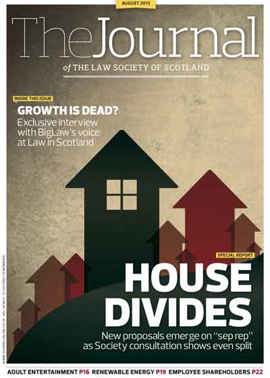Whistle for reform

Whistleblowing law and practice has had something of a shakeup recently, as a result of changes flowing from the Enterprise and Regulatory Reform Act 2013 (“ERRA 2013”). But it seems things are not set to end there.
The Government had already indicated that more was to come, and now a call for evidence has been issued which seeks to analyse the effectiveness of the current legal regime.
The Government wants to know whether the current categories of disclosure which qualify for protection are effective in capturing all instances of whistleblowing.
Setting the boundaries
What the Government believes does work well is the tiered protection regime, which means that the further removed from the employer is the disclosure, the more conditions have to be satisfied before an individual secures protection. In contrast, it believes the current system for the prescribed persons/bodies list is too rigid to effectively keep up-to-date with developments. Suggestions for change include a system whereby the Secretary of State can update the list without the need for a statutory instrument, or implementation of an all-encompassing definition for a prescribed person/body. Skilled drafters may therefore wish to sharpen their call-for-evidence-response quills.
The Government also sympathises with prescribed bodies’ qualms about the role they are currently able to play in protecting whistleblowers and investigating cases. A system of mandatory referral from the employment tribunal is suggested as a replacement for the current system whereby permission has to be given by the claimant before information can be passed to a regulator.
On the question of who can claim, there was some tinkering around the definition of “worker” in the most recent reforms (Employment Rights Act 1996, s 43K, as amended by ERRA 2013, s 20). The Government now wants to know whether protection should be extended further, in particular to cover job applicants and what it refers to as the “blacklisting of whistleblowers”.
Money in it?
Interestingly, the call for evidence briefly addresses financial incentives for whistleblowing, concluding that “the current evidence base is not robust enough for consideration to be given to the introduction of financial incentives”. This may have been something of a last minute addition, prompted by work already underway by the whistleblowing charity, Public Concern at Work (“PCAW”).
PCAW has convened a Whistleblowing Commission, chaired by a former Court of Appeal judge and counting among its members Michael Rubenstein, Sarah Veale of the TUC, John Longworth of the CBI, senior figures from private and public sectors, and actual whistleblowers. Of the potential for financial incentives, the Commission’s consultation document stated:
“At present there is a sense that for those who blow the whistle to prevent damage and disaster, there are more risks than benefits. Whistleblowing is not often rewarded within business, either in appraisal structures, promotion or remuneration processes, or even in mere thanks. Yet both the Office of Fair Trading and the HMRC have discretion to provide rewards for information. These are not widely-known provisions.”
The PCAW consultation closed in June and the Commission is set to report before the end of the year. This may therefore collide with the conclusion of the call for evidence, which will run until 1 November 2013.
Pushing in both directions
Issues arising from the Leveson Inquiry, banking scandals, and NHS gagging clauses are among the reasons why whistleblowing has found itself firmly back in the spotlight in recent months. Add to that the suggestion that when the unfair dismissal qualifying period was increased to two years for those commencing employment on or after 6 April 2012, this could lead to an increase in whistleblowing claims. With the cap on unfair dismissal compensation having been amended as of 29 July 2013 to the lower of 12 months’ pay or £74,200, there are further suggestions that more whistleblowing claims could result.
Identifying whether this has – or will – in fact be the case may prove difficult, as whistleblowing claims are no longer identified separately in the employment tribunal statistics. And of course, set against this, we have the introduction of fees, which in a whistleblowing claim will require a tribunal issue fee of £250 and a £950 hearing fee. Then there are the results of a recent PCAW survey conducted by YouGov, which found that, despite almost 15 years of legal protection, the majority of workers are unaware of the law that protects whistleblowers.
So, will the recent media and Government spotlight encourage more whistleblowing, and, together with the changes to the tribunal jurisdiction, potentially more whistleblowing claims? Or could a shift in attitude result in fewer instances of unfavourable treatment of whistleblowers? While we can only speculate as to the potential effect of the recent shakeup on the number of viable claims, with the introduction of fees it may be reasonable to envisage that, in future, fewer whistleblowing claims will actually make their way to the tribunal.
In this issue
- Widening access to the stocks and gallows?
- Family migration revisited
- The same but different
- Controlling tendency
- ESPC: out of the parental home
- Offshore employment: floating goalposts?
- Reading for pleasure
- Opinion column: David O'Hagan
- Book reviews
- Profile
- President's column
- Make the most of your "multiples"
- Sep rep: all to play for
- The bigger they are...
- Licensed to thrill
- Capacity challenge
- One year, and counting?
- Selling your rights... for what?
- The voice of technology
- A serious matter
- Relocation: where are we now?
- Whistle for reform
- Same sex marriage: for richer, for poorer
- Scottish Solicitors' Discipline Tribunal
- Residential property review takes shape
- In-house lawyers seek a rising star
- Mentoring: the way forward
- How not to win business: a guide for professionals
- Comm prop risks
- Ask Ash
- Crossed purposes
- Conference looks for profession to evolve
- Law reform roundup
- Help with the red flags






